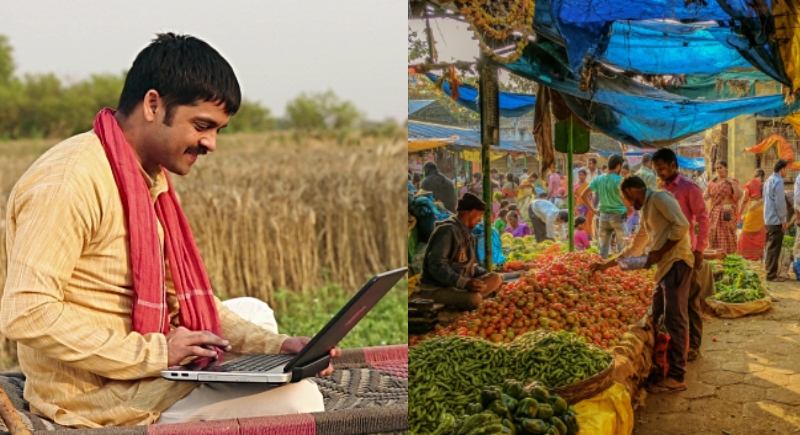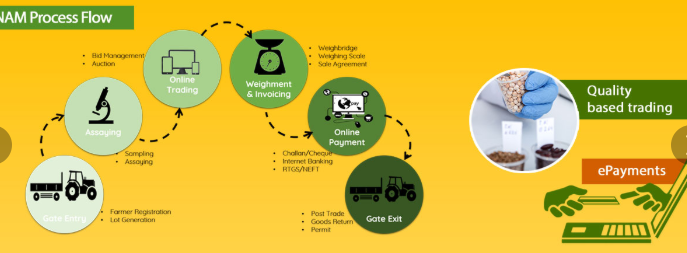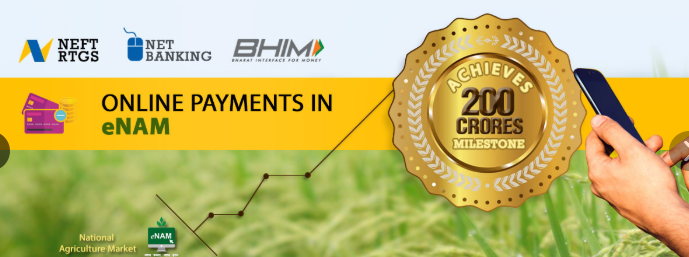eNAM- a digital market, support system of hard working farmers
Indian farmers are the backbone of Indian economy. Villages and farmers are "the souls of the soil" of this nation. A farmer sows a seed and does hard work in all favourable and unfavourable seasons. It is expected that farmers should get reasonable returns of their hard work. When the prices of commodities “farm produce” like vegetables, pulses, cereals, oilseeds, spices, and other daily grocery go up, it is observed that there is always a large difference between farmers’ income and the final cost of that farm product. Most of the money is grabbed by the middlemen when a farmer goes to the market yard to sale his product.

When there is a bumper crop, drought or flood; price of the products fall and at many times farmers have to sell his produce at a throwaway price to the middlemen. To avoid losses of farmers government set up MSP for each farm product. MSP is the umbrella for farmers which give relief from middleman and selling product below market rates.
MSP, (Minimum Support Price) is set for agrarian products by the government of India. MSP is meant to safeguard the farmer to a minimum profit for the harvest; if the open market has a lesser price than the cost incurred.
Farmers protest is common scenario whenever prices fall for farm products. They have a continuing demand for a rise in MSP's.
The central government has given a lift to farm products; it gave access to the broader online market. The government has initiated a project across India, “one nation and one market” which is being developed and soon in future this market will work in-tune with the international market.
In July 2017, Karnataka was the first state to initiate major reforms in agricultural marketing through the creation of a Special Purpose Vehicle — Rashtriya eMarket Services (ReMS). Karnataka has declined to join the central agriculture ministry-promoted national electronic platform, National Agriculture Market (eNAM), stating that inter-states trade is yet to be facilitated across the country.
National Commission on Farmers (NCF) president Padmashree M.S. Swaminathan had advised the then government, in his report in 2006 that proper attention should be given to the welfare of farmers along with agro-based study. The NCF included a number of recommendations for enhancing the income of farmers. It took almost a decade to consider these suggestions. In 2014 Modi led BJP government has implemented a lot of reformatory schemes based on these suggestions.
Implementation of the Swaminathan Commission report means improving living standards of farmers and upliftment of farm sector, said agriculture minister Radha Mohan Singh on 8th August 2018.
National Agriculture Market (eNAM) is a pan-India electronic trading portal which is a network of the existing APMC bazaars to create a unified national market for agricultural commodities. An Agricultural Produce Market Committee (APMC) is a marketing board established by state governments.
The eNAM Portal provides a single window service of all APMC's across India, It provides goods prices, availability, and stock of goods, buying and selling.
The eNAM electronic trading platform has been created with an investment by the Government of India through the Ministry of Agriculture and Farmers’ Welfare. In a way, its value-added service to market-yards pans India. It is a competitive platform which connects government and private market yards alike which in return assures farmers with "best possible return for their goods". Special software is developed for this, any APMC market can connect to eNAM with their existing application. It's free for any APMC market and customization is available as per the state APMC acts/rules.

The important aspects of this platform will be transparency, ease of trading through the online platform or mobile (i.e. regional languages), accessibility to administration, farmers and other stakeholders. Previously inter-state trading was a difficult task and it was done through certain middlemen or third-party agencies, nonetheless, distance and language used to increase challenges. eNAM will break this vicious circle and will give direct access and benefits to farmers for sure. Ultimately it means increases in income through appropriate monetization of farmers’ produce.
136 inter-State transactions & 14 farm products which include vegetables, pulses, cereals, oilseeds, spices, etc. have been traded under interstate trade through e-NAM platform in a short span of time. Rajasthan is the first State to start inter-State trade with more than one State, establishing trade link with Gujarat, Maharashtra & Madhya Pradesh through e-NAM. The volume of inter-State trade is also picking up as farmers & traders are gaining confidence in the system.

For example, Inter-State trade of agricultural produce in wholesale mandis through National Agriculture Market (e-NAM) platform is gathering pace with the latest transaction taking place at Madhya Pradesh Mandsaur e-NAM mandi, which sold coriander to Ramganj mandi of Rajasthan.
Interstate transaction is taking place at Maharashtra’s Akola e-NAM mandi, which sold green gram to Nokha mandi of Rajasthan.
So far 21 e-NAM mandis of eight States namely Uttar Pradesh, Uttarakhand, Andhra Pradesh, Telangana, Rajasthan, Gujarat, Maharashtra & Madhya Pradesh had joined hands to start inter-State trade on e-NAM.
“Logistic providers” information is also being provided in the e-NAM portal to traders from outside the State, which will facilitate transportation of commodities after trading. An Inter-State dashboard on eNAM platform has been developed to promote inter-State trade among e-NAM States.
Important points regarding this market --
· A national e-market platform for transparent sale transactions and price discovery initially in regulated markets. Willing States to accordingly enact suitable provisions in their APMC Act for promotion of e-trading by their State Agricultural Marketing Board, APMC.
· Liberal licensing of traders or buyers and commission agents by State authorities without any pre-condition of physical presence or possession of shop or premises in the market yard.
· One license for a trader valid across all markets in the State.
· Harmonization of quality standards of agricultural produce and provision for assaying (quality testing) infrastructure in every market to enable informed bidding by buyers. Common tradable parameters have so far been developed for 69 commodities.
· Single point levy of market fees that is on the first wholesale purchase from the farmer.
· Provision of Soil Testing Laboratories in or near the selected mandi to facilitate visiting farmers to access this facility in the mandi itself.
According to state wise data given by Agricultural authority—
· The eNAM portal, launched by the Centre in April 2016, has 45.4 lakh farmers and 417 mandis across the country registered with it. In May 2018, 585 regulated mandis in 14 states are linked with the electronic National Agriculture Market (eNAM).
· 73.50 lakh farmers, 53,163 commission agents and over 1 lakh traders are registered on the eNAM platform from these states.
· The 14 states include Andhra Pradesh, Chhattisgarh, Gujarat, Haryana, Himachal Pradesh, Jharkhand, Madhya Pradesh, Maharashtra, Odisha, Rajasthan, Tamil Nadu, Telangana, Uttar Pradesh and Uttarkhand.
· As per planned earlier, in the first phase, the government wants to ensure all wholesale agri-mandis adopt online auction and gradually will allow trading between mandis in a state and eventually between mandis outside states, thereby setting up a single national agriculture market for the benefit of farmers.